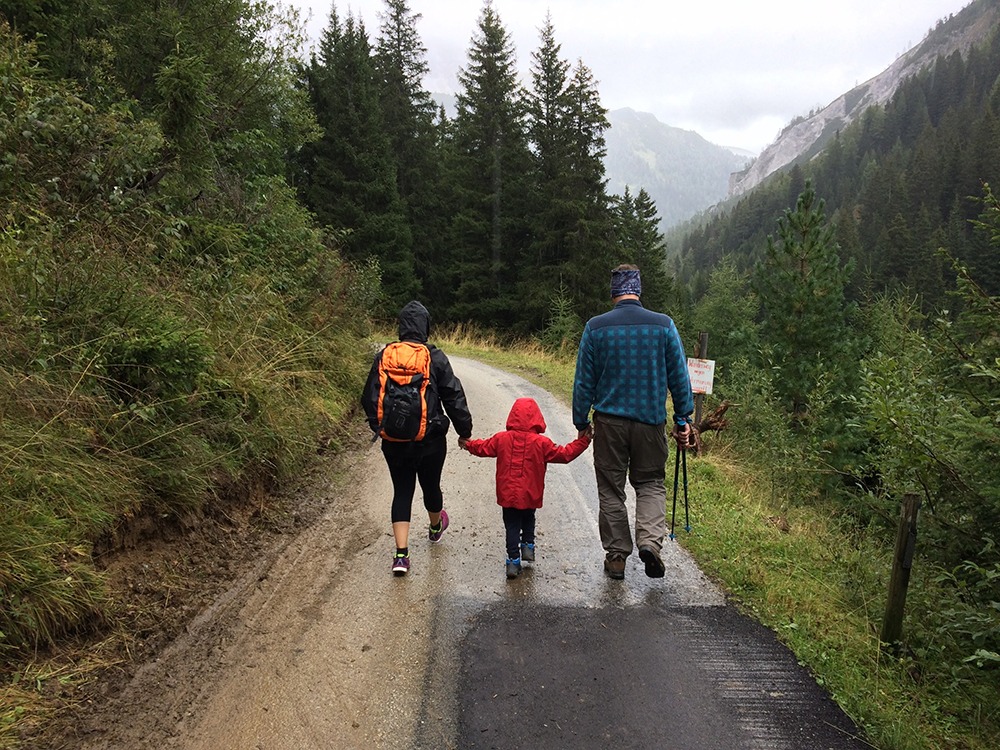We all have trauma
There are many varieties of trauma and, as far as I’m concerned, all of us carry some form of it. That is why, facing your past and coming to terms with it is an unavoidable step on the path of sorting out your present life. Where does trauma really come from, and how can we prevent it?

Since I train in the field of psychotherapy and I work as a therapist only in the IFS model, I cannot get over the fact how much of what is happening in our everyday life has its source in the past.
Of course, I have always been aware of how important childhood is in one’s emotional development. However, I have the impression that a relatively small part of our society is aware of how much of who we are today is a direct result of a number of events and situations we experienced in the past.
I also think that many people believe that trauma doesn’t concern them, which in most cases is a wrong attitude, discouraging them from looking at their past with curiosity.
In my office, I have repeatedly encountered situations, when people, who didn’t have a history of severe trauma, could indicate seemingly insignificant events from their childhood that, in fact, left a big mark on their psyche. Each such mark, being an unhealed emotional wound, affects us even when we have long forgotten about the said event. Or, in the case of a trauma experienced as a fetus or a newborn baby, when we have no memories in the form of an image or a concise narrative about what happened, the emotions associated with the event are stored in our body.
When I started to experience this during my own therapy, I couldn't remain indifferent to that fact. To my surprise, certain difficulties in my adult life, like perfectionism, workaholism, shyness, had its roots in situations that I would not call "traumatic" at all, and which I have long forgotten about.
- What came back to me during one of the sessions was a situation, when I got a slam from my dad for setting the dried grass on fire at my neighbor's lawn (the fire spread in a few seconds and it was pretty close to reach the neighbour's house).
- At another time, I recalled a situation when I got a B at a maths test and when I got home, all I could hear was "why not an A?". At that time, the feeling of being "not good enough" was seeded at me.
- I also remember well the moment as it came back to me when I was on one of my first holiday camps, dying of loneliness. I remembered I had to share a room with boys who disliked me, and I felt "different".
- I also had a vivid memory from my elementary school: a "colleague" of mine came up with a nasty nickname for me, which he would use whenever he had a chance.
And although my parents showed me a lot of love, and I think they did a wonderful job raising me (for which I would be grateful to them for the rest of my life), they were unable to avoid situations that left a lasting mark on my psyche. Sometimes, because they had no idea that it would hurt me in any way, and sometimes because they were simply not there for me all the time. Every child experiences moments of distress from time to time, and no matter how hard we try to protect our children, we cannot do much about it.

The more I realized how the events from my past shaped my personality, the more I became fascinated by the subject of trauma. After my recent training "Trauma & Neuroscience", which I took part in during my IFS studies in the UK, I decided to share my thoughts on trauma here on my blog.
How does trauma begin?
It is crucial to understand that you cannot avoid trauma in your life, regardless of whether you look at it from the perspective of a child, a parent raising children, or an adult who carries emotional wounds. Trauma concerns all of us.
The good news is that, once we understand what trauma is and what causes it, we won’t need to avoid such situations at all costs, because we will know that this is not the event itself, but our response to it that has a key impact on the formation of any emotional wound.
Most people think the mechanism is simple: you go through a difficult, hurtful or in any other way traumatic experience in childhood, and it leaves a mark that can rule your everyday life.
It turns out that this is not entirely true. The very traumatic experience is not the reason why we struggle with tough emotions in our adult life.
In fact, what is of greater importance is the way we deal with this experience afterwards.
Let’s imagine two children, Adam and Arthur, who are both 12 and happen to be in the same situation. Each of them wakes up at night and hears their parents quarrel. Scared, they both go to see what is going on. They both look through the keyhole in the parents' bedroom door and see their dad hit their mother and call her names. However, the scenarios of what happens next are different in each case.
Adam
Terrified, Adam runs to his room crying. After some time, his mother comes to his room, hugs him, explains what happened, listens to him speak about his emotions and lets him cry it out. She is warm and caring, despite the fact that she’s not in a good place herself. Adam has the ability to really “feel” his emotions and integrate this difficult experience. With time, he calms down. He is able to come to terms with what happened and make inner sense of his emotions.
Arthur
Also terrified, Arthur runs away crying and shuts down in his room. His mum comes in and trivializes the whole situation saying that nothing happened. She keeps telling him to stop crying because there is no reason for that, and that he should calm down immediately and stop acting like a brat. In this way, she makes him deny and suppress the emotions he is feeling right now. As a result of that, emotions are stuck in his body, pushed underground, locked in the subconscious, from where they will keep surfacing in the coming years. Artur doesn’t understand what happened and is unable to make inner sense of this situation.
In Adam’s case, this experience is not going to affect him in his adult life (of course, it can affect his beliefs, but this particular situation shall not create a deep, unhealed wound).
In Arthur’s case, however, we are dealing with trauma. Although, from an adult perspective, one can think of much worse things that a child can experience, in Arthur’s inner world such an event is remembered as something traumatic. If he is not allowed to accept his emotions, and given the right to express them, they will stay with him for years, locked inside.

It may be similar in a situation where a teenage girl is distressingly abandoned by her boyfriend, who she has been dating for the last few months (and who decided to hook up with her friend). It's easy to imagine a scenario, in which her parents, hearing this, smirk and disregard the emotions of their daughter, wrapping it up with "Ah, there are plenty more fish in the sea, don’t worry about it." For this girl, her whole world has just collapsed. Being unheard and misunderstood by her parents can contribute to the feeling of rejection being frozen inside her for years.
How come all these emotions can get stuck in our body for so long? Trauma is an energy that has been gathered and mobilized in our body to help us survive a difficult period of time. If it is not properly channelled after the stressful event, it will be stored in our body until it finds an outlet.
From the neuroscientific point of view, when our normal reaction to a traumatic event is blocked, our primitive (reptilian) brain, does not cease to release stress hormones, even long after the triggering situation. This mechanism limits the activity of our prefrontal cortex, keeping our brain “offline”. In this situation, the amygdala and limbic system (responsible for emotions) start to rule our lives. Trauma is, therefore, a process through which our body keeps defending against a threat that took place in the distant past.
For this reason, it is said more and more often that psychotherapy models based on a purely "rational" approach (i.e. a cognitive-behavioral therapy) are not effective in treating trauma (if you want to learn more on why, click here and here). Just realizing and understanding difficult experiences, although often helpful, is not enough for our body to release the post-traumatic stress.
Growing up always involves trauma
When we take a wider perspective on trauma, instead of narrowing it down to the most severe and tragic experiences (such as the death of a parent, rape, tough breakup), we must admit to ourselves that it is UNAVOIDABLE for parents to contribute to leaving smaller or larger wounds in the child's psyche. Growing up always involves going through some kind of trauma, just as it involves getting a bump or bruise here or there, when you are a child.
I would not be surprised if right now those parts of you that don’t want to inflict any suffering (especially on your own children) and who are trying so hard to be perfect parents, dismiss as nonsense all that this Michael whatshisname is writing here. This reaction is totally understandable. You might claim that you have never done anything to your child that could leave a lasting mark on him or her in any way.
At the same time, I would encourage you to open up to this truth, because you will find peace, once you come to terms with it.
The thing is, you can't predict what exactly is going to leave a mark on your child's psyche. It’s outside your control, because the child's mind is governed by its own laws. Which means that even if you do everything out of your great love, your child can understand it in a completely different way, feeling rejected, unwanted or neglected. In other words, he or she can feel a whole bunch of emotions different from what you might have expected.
For example, when you wanted your daughter to learn to care for others and, to this end, you asked her several times to share with her sister a gift that she had received for some occasion, she might have felt as if she didn’t deserve to keep anything just for herself. Or, in order to give your son a boost, you refrained from praising, or told him that he could do better, from which he might have concluded that he would not be able to cope with life, because whatever he was doing, it was always not good enough.
Whenever your child is to hear a hurtful or critical comment from you, witness a quarrel, stay alone for 20 minutes left at the door of a store, be negatively assessed by the teacher in front of the whole class - each of these situations can leave a mark that will be the seedbed for various mental blocks and difficulties in his adult life. Even more interestingly, they don’t need to be wounds visible at first glance, quite the contrary, most often they are deeply hidden emotions, from which we escape using various strategies and defense mechanisms.
Taking all this into account, I really recommend that you accept the fact that, no matter how hard you try, you are still going to influence your children’s psyche, also in ways you sometimes wish you didn’t.
Empathic witness
The good news is that even if your child acquires some emotional wounds, we still have a direct influence on whether and how they can heal. It all depends on how we approach their emotional reactions that arise around a specific event. This alone can determine whether and how much the fresh wound is going to heal. It can freeze in the child’s body as trauma that will determine his personality in his adult life, or become just a long-forgotten, emotionally meaningless memory.
Peter Levine, the author of Somatic Experiencing (a method of treating trauma by bodywork) asserted that:
“Trauma is not what happens to us, but what we hold inside in the absence of an empathetic witness.”
In other words, trauma means suffering in isolation. Therefore, if you want your child's emotional wound to heal naturally, you need, first of all, to be there for him and let him express the emotions he is feeling. Be an empathic witness to what is happening in your child's inner world. Embrace all his emotions and do not deny whatever he is experiencing. Let him cry, or let him be angry, or let him be sad. All these emotional states are natural reactions to a difficult experience and there is a safe space needed, in which they can be freely expressed.

Your task is to ensure such space for your child. Don't tell him his feelings are redundant or out of place. Say that you understand what he is feeling and why. Tell him it's okay to feel that way. If he is sad, tell him that he can be as sad as he wants or needs to right now. Do not try to make him change the emotional state he’s in.
I realize that this is not easy. Each parent has a built-in desire to release their children from emotional pain immediately. However, just like when your child burns himself - although the burn mark doesn’t look nice and certainly can cause some pain - you are not able to accelerate the healing process. In fact, the only thing you can do is dress the wound properly and prevent the sore spot from infecting, so that it heals smoothly. It is similar with the psyche, which knows perfectly well how to heal, it only needs the right conditions to do so.
We all carry trauma
Let's leave the issue of parenthood, because regardless of whether you have children or not, you carry your own traumas yourself.
If you feel resistance, when reading this, give yourself a moment before you deny what I want to tell you. I don’t mean heavy traumas, which is what we usually associate the word "trauma". I mean all those situations that in the child's world, at that particular stage of his life, were so difficult for him that he couldn’t cope with the emotions that arose in the particular situation.
In psychological terms, this is called Type II trauma, sometimes referred to as interpersonal trauma. Some examples of experiences, which cause this kind of trauma include: physical abuse (e.g. even in a minor way), psychological abuse, i.e. emotional abuse (e.g. mocking, humiliating, verbal threats and intimidation, punishing), sexual abuse or assault, as well as childhood neglect (e.g. ignoring child's emotions).
There are also intergenerational traumas. Even if our childhood was stress-free, most of us carry the trauma passed from our ancestors affected by trauma. Decades after World War II, it was discovered that the second generation of the offspring of people who survived the Holocaust seek psychiatric help three times more often than their peers. It is said to have been caused by the epigenetic transmission, i.e. the reformation of gene expression (rates of evolution can be much faster with epigenetic inheritance than with normal genetic mutations).
So it looks like your problems can be rooted in a time when you haven't even been born yet.
And speaking of intergenerational trauma, let's not forget about prenatal exposure to trauma. Everything that happened to your mother while you were still in her stomach had a direct impact on you. When my mother was 4 months pregnant, my grandfather died. My mom was very close with her dad and his death was great distress for her (especially since it was unexpected). Although I wasn't yet in the world at the time, this trauma has also affected my life and is one of the issues I work on during my psychotherapy.

I also worked with a woman who, at some stage of her therapy process, dug to the deeply buried feeling of being "unwanted". In her imagination, she saw an image of a small fetus and, after a few moments, she contacted with this poignant and extremely difficult feeling. She suddenly understood why she had been feeling this way. A few years ago, she learned from her parents that they had got knocked up, been very afraid of having a child and had a lot of doubts about this pregnancy.
In my work with clients, we often came across seemingly prosaic situations from the past that left a lasting mark in their psyche. On countless occasions, right after the session I heard words like, "I didn't expect that situation to have had such a big impact on me." Of course it did! And of course you couldn’t have expected that! It is quite natural that we can remain unaware of it for years.
This is because when (as in Arthur’s case) our emotions were not accepted by others (or by ourselves, because we were taught not to accept difficult feelings), these emotions were not expressed, released or calmed down. That’s why they keep dwelling inside us, frozen in our body.
This emotional energy charge constantly looks for an outlet. The emotionally burdened parts of our personality want to be noticed and heard out, so they try to get your attention in various ways. Sometimes, for no reason at all, during the day, we may feel flooded with feelings of sadness, regret or guilt - these are all emotions that still dwell in us, because they were once treated as something bad and thus suppressed.
Our psyche cannot allow us to experience all these emotions every day. We would not be able to function in life. Therefore, when we experienced trauma, other parts of our personality - the protectors - were called to action. Their job is to suppress and deny difficult emotions, in other words, keep them in check:
- Sometimes it is an internal perfectionist, who does everything he can to suppress the feeling of being rejected ( by someone’s negative evaluation of our work).
- Sometimes it is an internal workaholic, who wants to achieve as much as possible, so as not to experience the feeling of worthlessness (in the case of a failure).
- Sometimes it is a shy guy in us that avoids deeper relationships because he is afraid of being hurt again when he decides to open up and get close to other people.
If we have more such wounds, our defense mechanisms begin to rule our inner life. Sometimes to the extent that we are completely cut off from our emotions. For some of us, it manifests itself as an extremely rational attitude, while for others - as a chronic feeling of indifference to everything that is going on with them. It all depends on what strategies for dealing with emotional pain we've picked up throughout our lives.
If our defense mechanisms fail to cope with the overload of difficult feelings, then the parts that help us alleviate this pain come into action. Then, there is a great chance of developing various addictions, which make us feel good, even if just for a moment. From alcohol, through drugs, gambling or sweets, to social media and sex - all of this can be a way of escaping or avoiding the surfacing pain, which is still seeping in our body.

The childhood trauma determines the personality we develop in adulthood. Of course, the good news is that healing trauma frees us from the uncomfortable aspects of our personality that we usually want to change in ourselves.
Our core emotional wounds from the past are often so deeply buried in our psyche that we completely lose conscious access to them. We can even forget about the childhood trauma altogether. Psychotherapy is an opportunity to move deeper to be able to uncover these past experiences and go through the process of internal healing.
Besser Van Der Kolk, a Professor of Psychiatry at Boston University Medical School and Medical Director of the Trauma Center in Boston in his book (which is really great, by the way!) The Body Keeps the Score: Brain, Mind, and Body in the Healing of Trauma wrote:
“As long as you keep secrets and suppress information, you are fundamentally at war with yourself…The critical issue is allowing yourself to know what you know. That takes an enormous amount of courage.”
Give yourself what you weren’t given as a child
We all have some wounds that have not been embraced or taken care of as they should have.
What can we do to heal? In your therapy work, you can give yourself everything you didn’t receive when you faced a difficult situation as a child. You can look into your past and embrace your emotions, that is give them your attention, show them understanding and compassion. What has not healed earlier, can still be healed now. The therapeutic relationship alone will provide you with what you may have lacked as a child. For many of us, being heard out and accepted the way we are is something we never experienced when we were kids.
Bessel Van Der Kolk elaborates on this in his book:
“Neuroscience research shows that the only way we can change the way we feel is by becoming aware of our inner experience and learning to befriend what is going inside ourselves.”
The first step towards achieving this is to realize and accept that all of us, without exception, carry emotional wounds from childhood. Therefore, no matter how hard you try to avoid looking deep inside yourself, in order to deal with the discomfort you feel now in your adult life, in most cases you will have to uncover these forgotten emotions and meet these suppressed parts of your personality, so as to finally let them go.
Just a few years ago, I strongly believed that in order to lead a happy and conscious life, we don’t need to "rummage” in the past. Today, however, I know that this “time travel” is not only valuable, but in most cases crucial, if we want to release tension and liberate ourselves from repressed emotions. Moreover, such a journey can also be an opportunity to move towards a deeper internal transformation, not only on a purely "mental" level, but also on a spiritual one. For many people, psychotherapy gives a chance to redefine who they are, what their place in this world is and what it all means to them.

Understanding this has quite significantly influenced the way I perceive my personal role in this world. Until now, I have focused on the fact that in order to do something good for our confused society, I need to start a revolution in how we understand and organize education. Transforming education is still one of my priorities, but now I know that this is not enough. We also need to revolutionize our approach to psychotherapy. We need to deal with myths and misconceptions about therapy. We need to make society aware of how important this method of work is, but also promote and create new methods of therapy.
In the next articles on trauma, I will write more about how it affects our psyche and our body. Also, I will elaborate on the worldwide crisis in the mental health care system, as well as present several innovative, still not very popular, methods and techniques of treating trauma.
Finally, I would like to share with you the optimistic vision of Peter Levine on healing trauma:
"I have come to the conclusion that human beings are born with an innate capacity to triumph over trauma. I believe not only that trauma is curable, but that the healing process can be a catalyst for profound awakening—a portal opening to emotional and genuine spiritual transformation. I have little doubt that as individuals, families, communities, and even nations, we have the capacity to learn how to heal and prevent much of the damage done by trauma. In so doing, we will significantly increase our ability to achieve both our individual and collective dreams.”
Share in the comments what emotions you feel after reading this article and whether any past events come back to you that might need a closer look.
